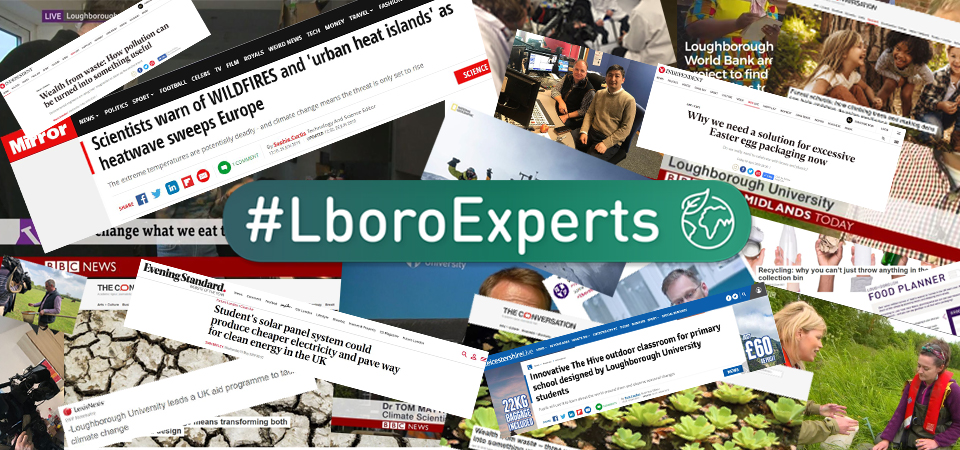1 Jul 2019
University Environment Campaign ends after 84 days of promoting the best of Loughborough’s expertise and research
Loughborough's environment PR campaign ends today after a 12-week spell which has spread news of our game-changing research to millions of people worldwide.
Since April 5, the University has actively promoted its expertise in a number of areas related to climate, sustainability, CO2 reduction, pollution, renewable energy and engineering.
Our academics have appeared on the BBC and Sky News – as well as in Physics World, National Geographic and the Conversation, all under the banner #LboroExperts. Many also feature in the new Loughborough Game Changers campaign, which has been designed to raise the profile of the University’s innovative work that is making a real difference to society.
In total, more than 20 researchers have been given the opportunity to showcase their work.
To mark the end of the campaign, members of the PR team travelled to St Bartholomew’s Primary School, in Quorn, to discuss some of the projects featured in the initiative.
After hearing about solar engineering, recycling, plastic waste and other research themes, the Year 6 youngsters were asked to create a slogan which reflected how they felt about the environment and name the Loughborough bear - who would deliver the phrase.
They chose David Atten-Bear and the motto: Clean up your mess... so we don’t have to.

But the green research the pupils learned about reached a far wider audience than just Charnwood.
Dr Jin Xuan, from Chemical Engineering, and Dr Benjamin Buckley appeared on BBC television and radio and in numerous newspapers.
They have developed a system of industrial carbon capture, which grabs pollutants from factories before they are released into the atmosphere and transforms the CO2 in green fuels and useful chemicals.
Other featured projects included Physicist Dr Niladri Banerjee, of the School of Science, who wrote this feature for Physics World about creating greener supercomputers.
And Dr Tom Matthews, who took Loughborough University to new heights when he scaled Mount Everest and, with a frozen drill, installed the world’s highest weather station at 8,500 metres.
His experiences were documented by National Geographic and in the Conversation.
Other Conversation articles in the campaign included:
- Forest schools
- Wealth from waste
- How to recycle better
- Curious kids: Global warming
- Surviving climate change
The campaign also trialed the use of a new Q&A format on social media with Senior Lecturer in Physical Geography, Dr Richard Hodgkins.
The idea was to include members of the public and students, who sent their climate change questions via Instagram.
A short video was then created with Dr Hodgkins answering the queries.
The issue of food waste, which, according to the Waste and Resources Action Programme (WRAP), sees a total of 7.1 million tonnes of food being thrown away each year, was looked at by Dr Rhoda Trimingham, of the Design School.
She designed a food planner which allows homes to track their meals and more importantly, their leftovers – it is estimated that £15bn of edible food goes to waste each year in the UK.
In sub-Saharan Africa, the issue of malnutrition results in millions of deaths each year, as does household air pollution from inefficient cooking practices.
In April, we reported that Professor Ed Brown, of the School of Social Sciences, will oversee a five-year programme of work – worth £40 million – which has the potential to prevent premature deaths and reduce climate change by using electricity to cook rather than charcoal and wood.
To see more Environment Campaign stories, search #LboroExperts on Twitter.















